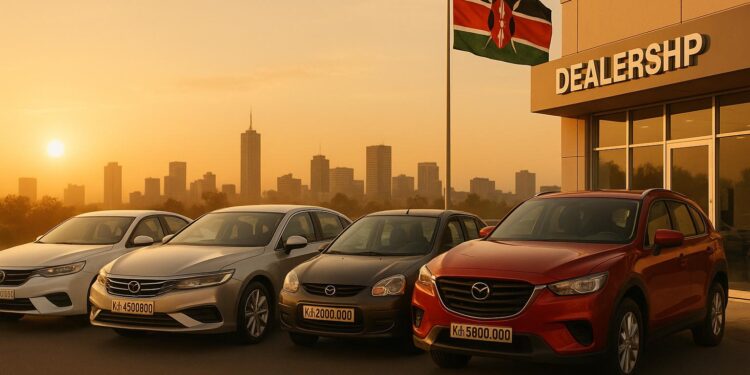Kenya’s car market is shifting in 2025, and prices are being impacted by several key factors:
- Government policies: New tax rules favor eco-friendly cars, while high-emission vehicles face higher taxes. Local assembly is being encouraged with VAT adjustments.
- Import regulations: Stricter rules on vehicle age and environmental standards are reducing the supply of older, affordable cars, driving up prices.
- Currency depreciation: A weaker Kenyan shilling is increasing the cost of imported vehicles.
- Consumer demand: Buyers are leaning toward smaller, fuel-efficient cars and electric vehicles (EVs), influenced by rising fuel costs and urban congestion.
What’s happening in the market?
- New cars: Prices are rising due to higher import costs and global supply chain issues, but dealers are offering more financing options.
- Used cars: Limited supply due to tighter import rules is pushing up prices.
- Electric vehicles: EV interest is growing, supported by government incentives and better charging infrastructure, though upfront costs remain high.
Key takeaway: If you’re planning to buy a car in Kenya this year, keep an eye on policies, financing options, and total ownership costs. These shifts in the market can affect your purchase decision.
Why Car Prices in Kenya will Rise Drastically from July 1- KRA Taxes
Main Factors Behind Car Price Changes in 2025
Several factors are influencing car prices in Kenya in 2025, including government policies, import regulations, currency fluctuations, and shifts in consumer behavior. Together, these elements are shaping the current trends in vehicle pricing.
Government Policies and Tax Rules
Government policies remain a major influence on car prices. Recent changes in tax regulations now favor eco-friendly vehicles while imposing higher taxes on high-emission models. For instance, some alternative-fuel cars enjoy reduced import duties, making them more appealing to buyers. Additionally, adjustments to the Value Added Tax (VAT) aim to support local assembly operations, encouraging manufacturers to rethink their strategies for the Kenyan market.
Import Rules and Restrictions
Import regulations have also undergone significant changes, affecting the availability and pricing of vehicles. Stricter environmental standards and tighter age limits have reduced the number of older cars entering the market, shrinking the pool of used vehicles. On top of that, more detailed customs documentation requirements are adding to import costs, further influencing prices.
Currency Changes and Economic Conditions
The depreciation of the Kenyan shilling has made importing vehicles more expensive. Combined with global supply chain challenges and shifting interest rates, these economic conditions are reshaping how and when people purchase cars.
Changes in Consumer Demand
Consumer preferences are evolving due to rising fuel prices and increasing urban congestion. Many buyers are now leaning toward smaller, fuel-efficient cars. Meanwhile, the growth of ride-sharing services has led some individuals to delay purchasing personal vehicles altogether.
Price Trends in New and Used Car Markets
Kenya’s automotive market is undergoing noticeable shifts in pricing for both new and used vehicles, influenced by economic changes and evolving regulations.
New Car Market Trends
In 2025, the cost of new cars has been climbing. Factors like currency fluctuations, increased import expenses, and global supply chain issues are contributing to these higher prices. To counter this, dealers are introducing more financing options to make these vehicles accessible to buyers. While the new car market adjusts to these challenges, the used car sector is also seeing notable changes.
Second-Hand Car Market Changes
The demand for affordable vehicles continues to rise, but stricter import regulations are limiting supply. This imbalance is pushing up prices in the second-hand car market.
Electric Vehicle Market Growth
Meanwhile, the electric vehicle (EV) market is gaining traction. Supportive government policies and improved charging infrastructure are encouraging more people to consider EVs. Although the upfront cost remains higher, the savings on operating expenses make them an appealing option. In the long term, initiatives like local assembly partnerships could help make EVs even more competitive in the market.
sbb-itb-e5ed0ed
Tips for Buying Cars in Kenya’s 2025 Market
Navigating Kenya’s car market in 2025 means being prepared for a landscape influenced by shifting policies and fluctuating prices. To make a smart purchase, it’s important to think beyond just the price tag and consider the broader costs and responsibilities of car ownership.
Total Cost of Car Ownership
Owning a car involves more than just the initial price. You’ll need to account for financing, insurance, routine maintenance, and fuel. These costs can add up quickly, so gathering updated quotes from local service providers and financial institutions is essential for accurate budgeting. Understanding these expenses upfront can help you make more informed decisions when it’s time to buy.
Smart Car Buying Strategies
Staying informed about government policies is crucial. Changes in import duties or taxes could directly affect car prices, so keeping an eye on official updates can save you from unexpected costs.
If you’re exploring the used car market, opt for reputable online platforms that provide certified used cars with verified inspections. This ensures a safer and more transparent buying experience.
Car Buying Decision Checklist
Here’s a straightforward checklist to help you organize your car purchase:
- Check the vehicle’s history: For used cars, confirm the service records, import documentation, and availability of spare parts. Always insist on a thorough inspection by a certified service center.
- Budget wisely: Factor in all recurring expenses like loan payments, insurance, fuel, and maintenance. It’s also smart to set aside an emergency fund for unexpected repairs.
- Compare financing options: Look into bank loans, credit unions, and dealer financing to secure the best terms for your budget.
- Think green: Eco-friendly vehicles can offer long-term savings in addition to reduced environmental impact.
- Review documentation: For imported cars, double-check that all certifications and tax payments are in order to avoid future issues.
- Plan for support: Choose a car with a reliable local support network, including access to qualified mechanics, genuine spare parts, and trustworthy service centers.
Conclusion: Getting Ready for Kenya’s Changing Car Market
Kenya’s automotive market is undergoing a major transformation, driven by new government policies, stricter import regulations, and fluctuating currency values. One key change is the July 2025 introduction of a rolling 7-year age limit for used car imports, which is set to reshape the industry significantly.
Interest in second-hand cars has skyrocketed, with a 329% increase recorded between June 2022 and September 2024. This surge reflects how economic pressures are influencing consumer choices. Additionally, the passenger car market is expected to generate $89.3 million in revenue in 2025, with SUVs making up 35.7% of new car sales. Hybrid models such as the Toyota Aqua and Honda Fit Hybrid are becoming increasingly popular, as rising fuel costs push buyers toward more fuel-efficient options, leading to higher demand and price increases for these vehicles.
These numbers highlight how policy changes are directly impacting the market. For example, when the High Court intervened in July 2025 to halt the Kenya Revenue Authority’s new CRSP schedule for used car imports, it demonstrated how quickly legal and regulatory shifts can influence pricing and availability. Staying informed about these developments can help buyers navigate price changes and make smarter purchasing decisions.
Meanwhile, the electric vehicle (EV) sector is picking up speed. A 41% jump in EV-related searches shows growing interest, though it also signals emerging challenges and opportunities for buyers.
For up-to-date automotive news, policy insights, and practical advice tailored to Kenya’s market, AutoMag.co.ke remains a reliable resource.
FAQs
How will Kenya’s new tax policies in 2025 impact the cost of eco-friendly cars?
In 2025, the Kenyan government plans to roll out tax incentives aimed at encouraging the adoption of eco-friendly vehicles, including hybrid and electric cars. These vehicles will qualify for reduced tax rates, making them a more budget-friendly option compared to traditional petrol or diesel models.
This initiative is designed to lower the initial costs of purchasing eco-friendly cars while also helping owners cut down on fuel expenses in the long run. If you’re in the market for a new car, choosing a hybrid or electric model could be a financially savvy decision – and a step toward supporting a greener future.
How will stricter import regulations affect the availability and pricing of used cars in Kenya?
Stricter import rules in Kenya, like the 8-year age limit on used cars, are pushing up the prices of imported vehicles. This happens because importing newer models, which naturally cost more, also comes with higher taxes.
For budget-conscious buyers, this means fewer affordable, older cars are available, leaving limited options. If you’re thinking about buying a car, it’s a good idea to plan ahead. Consider exploring local options or looking into newer imports to navigate these changes effectively.
What should I consider when choosing between a new electric vehicle and a used traditional car in Kenya’s evolving market?
When choosing between a new electric vehicle (EV) and a used traditional car in Kenya, there are a few important considerations to keep in mind:
- Cost: New EVs often come with higher upfront costs. However, they can save you money over time thanks to government incentives and lower running expenses, like cheaper electricity. Used traditional cars, while more affordable initially, often come with unpredictable fuel costs that can add up.
- Regulations and Taxes: Kenya has strict rules about importing used cars, allowing only those under 8 years old. This limits available options and can affect pricing. On the bright side, EVs and hybrids usually enjoy reduced taxes and import duties compared to gasoline or diesel-powered cars.
- Market Trends: With policies encouraging environmentally friendly vehicles, EVs and hybrids are gaining popularity. This shift could make them a smarter choice for long-term value.
In the end, your decision will hinge on your budget, driving habits, and how much you prioritize sustainability and potential future savings.
Related Blog Posts
- Car prices in Nairobi 2025
- Kenya restricts car imports to max 7 years old starting 2025
- Kenya considers new EV policies to support local adoption
- Car Prices in Kenya in 2025: Full Market Guide




